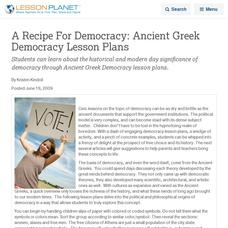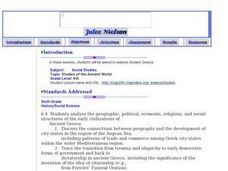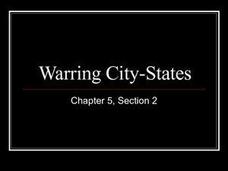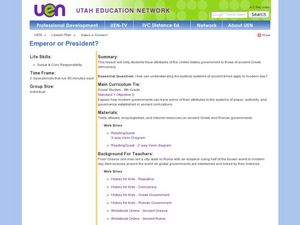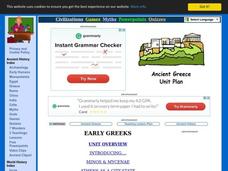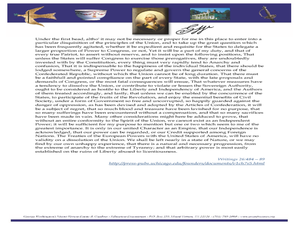Curated OER
A Recipe For Democracy: Ancient Greek Democracy Lesson Plans
Students can learn about the historical and modern day significance of democracy through Ancient Greek Democracy lesson plans.
Curated OER
Studies of the Ancient World
Sixth graders, after taking a pretest, write a paragraph describing the difference between Athens and Sparta and write an article about the ancient Phoenicians, describing their contributions to world history. They compare democracy in...
Curated OER
Classical Greece
Students research historical events in ancient Greece. In this ancient Greece lesson plan, students design a magazine which includes a cover, table of contents, cover story, advertisement and visuals. Students focus on Pericles and...
Curated OER
Warring City-States: Greek History
Ever wonder about Sparta, Greek city-states, or the Persian Wars? Cover these topics and several more, with this well-put-together presentation. Easy to follow and good for note taking, your class will be able to clearly understand the...
Curated OER
Emperor or President?
Sixth graders complete a Venn Diagram. For this government comparison lesson, 6th graders discuss how rules are similar and different at home, school and in their community. Students learn about the type and structure of the United...
Curated OER
A Trip Back in Time
Second graders, through the following 10 lessons, develop an understanding of what life was like in Ancient Greece.
Curated OER
The Glory That Was Greece: A Test
Did your class just finish a unit on Greek life, culture, and conquest? If you think they know everything there is to know about Ancient Greece, then put them to the test with this exam, which contains thirty multiple choice questions.
Curated OER
Democracy: An Introduction.
Learners study the U.S. Constitutional System and how it compares with forms of democracy that developed in ancient Greece and Rome. They list and explain the requirements it takes to form a society to be considered a nation.
Curated OER
Ancient Greece and Ancient Rome Unit Plan
Students make two T charts, one for Sparta and one for Athens, showing pros and cons for living in either city-state. They use the physical information from the map and the cultural captions given for Athens and Sparts to come to their...
Curated OER
Greece
In this comprehension worksheet on Greece, students read the article presented and then answer the questions that follow. There are 12 short answer questions to complete about Greece, where it is located, the people, celebrations, and...
Curated OER
Ancient Greek Philosophers:Socrates, Plato, and Aristotle
Pupils discover the famous Greek Philosophers. In this Greek lesson plan, students find the contributions of Ancient Greece and their philosophers. This lesson plan includes brief bios on Socrates, Plato, and Aristotle
Curated OER
To Be or Not to Be Democratic
Seventh graders explore the democratic republic principles of U.S. government. For this U.S. government lesson, 7th graders compare and contrast the governments of ancient Athens,the Roman Republic, and the United States today. Students...
Curated OER
A Trip Back In Time
Students develop an understanding of Ancient Greek life. Students explore cultural, political, and social processes that shape different city-states. Students discover people such as Socrates and Alexander the Great.
National Endowment for the Humanities
The Greek Alphabet: More Familiar Than You Think!
In this Greek alphabet lesson, pupils explore the Phoenician origins to the Greek alphabet. Learners compare Greek letters to current letters and write a paragraph about the life of learners in ancient Greece. They also identify...
Curated OER
Interview A Famous Greek
Young scholars become acquainted with historical people of Greece through research and role playing. They develop interview and research strategies which get to an historical person's achievements and personality.
Curated OER
Getting to Democracy
Students define democracy and analyze the conditions needed for democracy to flourish. Students research governments in the Middle East to determine how and if they have any form of democracy within their government.
Curated OER
Sparta and Athens
Sixth graders study Ancient Greece. For this Ancient Greece lesson, 6th graders complete 16 lessons to learn about Ancient Greece. Students complete a quiz for assessment.
Curated OER
Neo-Classicism
Taking students from the origins of Neoclassical art, architecture, sculpture, painting, and decorative arts to the "sunset" of the artistic movement, this slideshow provides ample infomation and examples of the art form. The slides...
Curated OER
When in Greece, Do as the Greeks Do
Students examine the contributions of ancient Greeks in this five lesson unit. The explorations reveal how Greece shaped our stories, our modern language, and our society. The study of the Greek myth forms the basis of this unit.
Curated OER
The Daily Athenian: A Greek Newspaper Project
Students work together to gather information from the internet and print sources about the Ancient Greeks. They discover what everyday life was like in Ancient Greece. They develop a newspaper to share the information they gathered.
Curated OER
The Greek Gods
What were the early Greek myths? Have elementary students examine the Persian Wars and read various Greek myth in order to identify the cause and the results of the Persian Wars. Myths, activities, simulations, and a unit plan are links...
Curated OER
George Washington & the Classics
Students will compare and contrast famous philosophers with George Washington. In this history lesson, students work in small groups to define Classicism, Legalism, Democracy, Republic and Civility, then read some short excerpts so...
Curated OER
Symposia: Scholarly Parties
Students hold a symposium during which students debate the benefits of democracy in ancient Greece and the United States. By doing this, students explain the role of symposia in ancient Greek culture and politics.
Curated OER
Ancient Rome and Greece
In this social studies instructional activity middle schoolers find the vocabulary terms in the word search. The answers are found by clicking the button at the bottom of the page.


